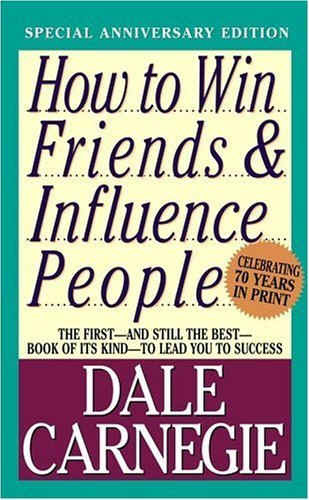If I had a list of books that should be required reading for all human beings, How to Win Friends and Influence People would be at the top. It’s been over 70 years since its first publication, but Dale Carnegie’s timeless gem is still providing insight in the 21st century.

Carnegie created the content for the book by giving talks in New York about public speaking. The talks evolved into how to deal with people in different circumstances. As Carnegie began providing more and more insight (and realized how little people really know about talking to one another) a publisher convinced him not everyone had time for a 14-week course on his valuable information. So a stenographer took notes, and the book was born.
You might be thinking, “I already have friends and I don’t necessarily care about influencing people” (even though you should). But that’s just the title of the book–not the total scope. It’s about handling people in all types of situations. Do you know how to get the best outcome in any argument? Or how about how to make just about anybody like you? Carnegie does, and he lets you in on his secrets.
The book doesn’t reveal anything truly revolutionary. There isn’t any insight that you haven’t heard one way or another. So what does Carnegie do to create one of the bestselling books in American history 915 million copies sold)? He compiles the most important information about influencing people through some of the simplest methods of implementation and takes you for a ride along the way.
Carnegie provides anecdote on top of anecdote to emphasize his points. Literally every single suggestion he makes is backed up by an example of it working quite flawlessly. Oh, and he does it by telling us things we all know but don’t want to hear.
We’re selfish. He says be humble. We’re concerned about ourselves. He says get over yourself. We want to talk. He says listen. Nothing we don’t know, but it makes so much sense when he says it.
Twelve ways to win people to your way of thinking. Nine ways to change people without giving offense. Seven rules for making your home life happier. Those are just a few of the sections in the book—there is so much more than those tiny tips. I met a guy who listened to the audio book literally every single day on his way to work. It’s that good.
Applying all of these methods in your life will take you longer than digesting swallowed gum—but start small and I promise you will see the impact even a few minute changes in your approach to people will make.
Who should read it: Salespeople, the competitive, humble servants, aspiring world changers, anyone who wants to love people more and build stronger relationships
Who should stay away: Those who are content in loneliness, pride, and all-around-self-consumed humans disinterested in others